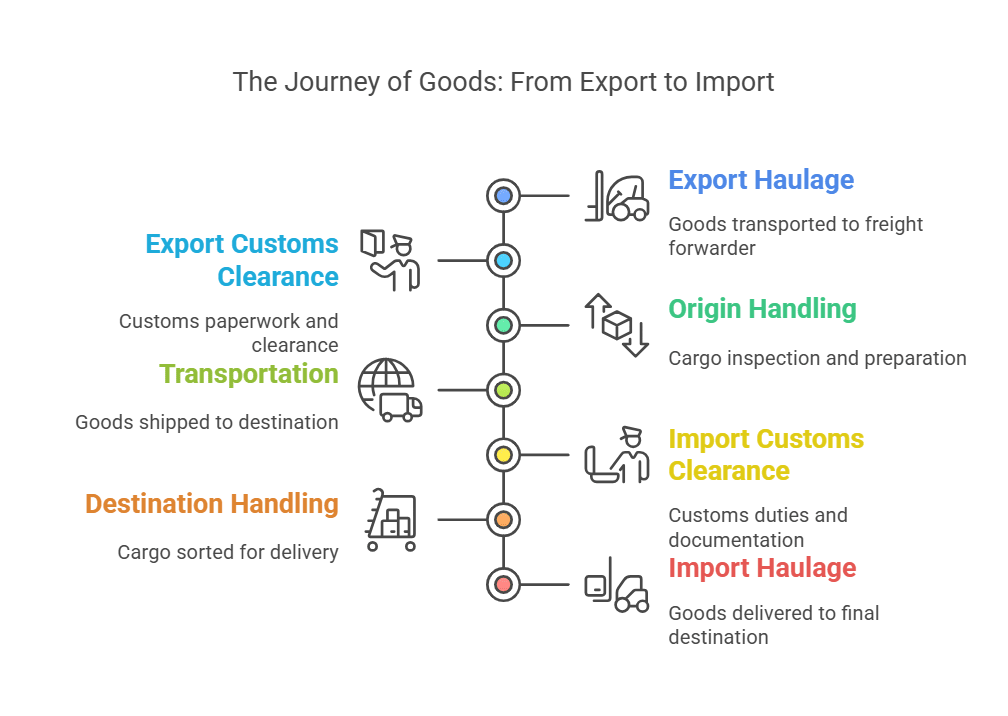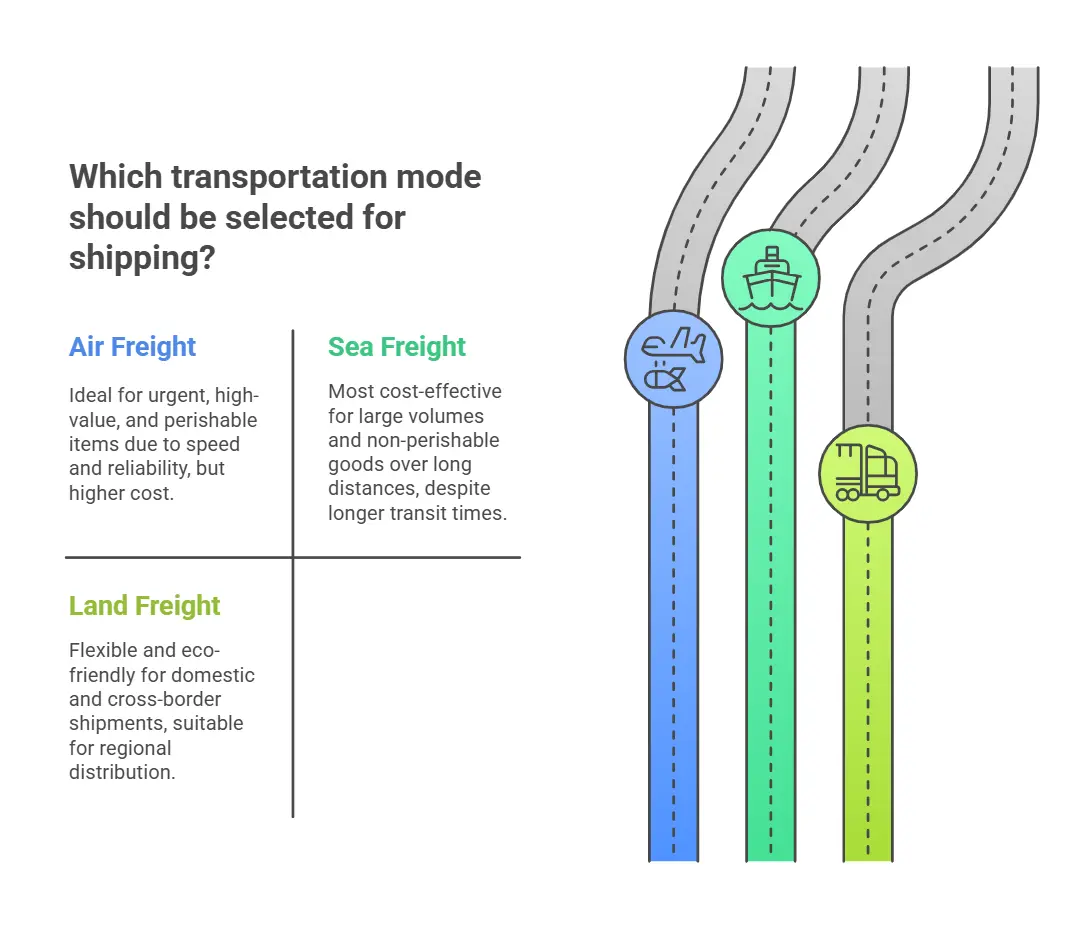When it comes to moving goods from one place to another—especially across international borders—the process can quickly become overwhelming. This is where a freight forwarder steps in. Acting as the middleman between shippers and transportation services, freight forwarders help businesses navigate the often-complex world of logistics, shipping, and supply chain management. Their job is to ensure that cargo reaches its destination safely, efficiently, and in compliance with all necessary regulations.
Whether you’re a small business looking to expand internationally or a large corporation managing high volumes of shipments, a freight forwarder can take the burden off your shoulders. They coordinate everything from customs brokerage and cargo transportation to warehousing and documentation. By leveraging their expertise and network, they simplify what could otherwise be a stressful and costly process.
Role of a Freight Forwarder in Logistics
Freight Forwarding is much more than just moving goods from point A to point B. It involves carefully planned steps to ensure smooth and seamless shipping. Here’s a closer look at what freight forwarders do:
- Coordinating Transportation – Choosing the right transportation mode is crucial whether it’s air, sea, or land. Freight forwarders analyze factors like cost, speed, and reliability to determine the best shipping method for a particular cargo. If a business needs to ship perishable goods quickly, air freight might be the best option, while bulk shipments that aren’t time-sensitive are often transported via sea freight.
- Managing Customs Brokerage – Dealing with customs can be a nightmare for businesses unfamiliar with import and export regulations. Freight forwarders handle all necessary paperwork, ensuring compliance with local and international laws. Without the right documents, shipments can be delayed or even seized at the border, resulting in costly consequences.
- Handling Documentation -Shipping goods involves a lot of paperwork, including bills of lading, commercial invoices, and certificates of origin. Freight forwarders make sure everything is in order, reducing the risk of errors that could delay a shipment.
- Cargo Consolidation – If a company doesn’t have enough goods to fill an entire container, a freight forwarder can consolidate shipments from multiple clients into one. This not only saves money but also optimizes space, making shipping more efficient.
- Warehousing Services – Freight forwarders often provide warehousing solutions where goods can be stored temporarily before being shipped to their final destination. This is especially helpful for businesses that need to manage inventory efficiently without investing in their own storage facilities.
- Risk Management and Cargo Insurance – What happens if the cargo gets damaged or lost in transit? Freight forwarders help mitigate these risks by offering cargo insurance and implementing risk management strategies. This ensures businesses are financially protected in case of unforeseen circumstances.
Understanding the Freight Forwarding Process
To get a better idea of how a freight forwarder operates, let’s break down the process into seven key stages:
- Export Haulage – This is the first step in shipping, where the goods are transported from the supplier’s warehouse or factory to the freight forwarder’s warehouse or designated port.
- Export Customs Clearance – Before goods leave the country, they must go through customs. Freight forwarders handle the necessary paperwork and obtain clearance from relevant authorities to prevent any hold-ups.
- Origin Handling – at this stage, cargo is unloaded, inspected, and prepared for the next phase of its journey. Freight forwarders ensure that everything is in order before shipment.
- Transportation – the goods are shipped via the selected mode – air, sea, or land – to their destination. This step involves coordination with carriers, tracking shipments
- Import Customs Clearance – Once the cargo arrives in the destination country, it must go through customs clearance again. Freight forwarders manage this process ensuring all duties and taxes are paid and documentation is in place.
- Destination Handling – The cargo is transferred from the arrival port or airport to the import warehouse, where it is sorted and prepared for final delivery.
- Import Haulage -The last step in the process is getting the goods to their final destination, whether it’s a retail store, distribution center, or directly to the customer.

Choosing the Right Transportation Mode
One of the biggest decisions in freight forwarding is selecting the right transportation mode. Each option comes with its benefits and drawbacks:
- Air Freight – Air freight is the fastest shipping method available, making it ideal for urgent shipments, high-value goods, and perishable items like food and pharmaceuticals. While it offers excellent speed and reliability, it comes at a higher cost compared to other transportation modes. Air freight is commonly used for electronic components, luxury goods, and time-sensitive deliveries where rapid transit is essential.
- Sea Freight – Sea freight is the most cost effective option for moving large volumes of goods over long distances. It’s widely used for heavy cargo, bulk commodities, and non-perishable goods. However, shipping via sea takes significantly longer than air freight, often ranging from a few weeks to over a month depending on the route. Despite the longer transit times, businesses opt for sea freight because it significantly reduces shipping costs, making it the preferred method for industries like manufacturing and retail.
- Land Freight – Land freight involves transporting goods via trucks or rail, making it the primary choice for domestic and cross-border shipments within a region. Trucking offers flexibility and can reach locations that are inaccessible by air or sea. Rail freight is an excellent alternative for moving large shipments over land, providing a more cost-effective and eco-friendly solution compared to road transport. Land freight is commonly used for regional distribution, e-commerce deliveries, and supply chain replenish

Why Freight Forwarders are Essential for International Trade
Freight forwarders play an indispensable role in international trade. Without them, businesses would struggle to navigate the complexities of shipping regulations, customs procedures, and transportation logistics. Here’s how they add value:
Regulatory Compliance – Different countries have different rules for imports and exports. Freight forwarders ensure shipments meet all legal requirements, preventing costly mistakes.
Supply Chain Optimization – By managing logistics efficiently, they help businesses reduce costs and improve delivery times.
Market Insights – With their extensive experience, freight forwarders provide valuable advice on shipping routes, pricing trends, and regulatory changes.
How to Choose the Right Freight Forwarder in Logistics
Selecting the right freight forwarder can make a significant impact on the efficiency of your shipping operations. Here’s what to consider when making this important decision:
- Industry Experience – Look for a freight forwarder with a proven track record in your industry. Experience in handling similar shipments means they understand potential challenges and can offer better solutions.
- Global Network – A well-connected freight forwarder with an extensive international network ensures smoother handling of shipments, especially for cross-border and overseas logistics.
- Service Offerings – Choose a forwarder that provides a comprehensive range of services, including warehousing, customs brokerage, cargo insurance, and risk management. A one-stop-shop solution simplifies the shipping process.
- Technology and Tracking Capabilities – In today’s digital world, having real-time visibility over your shipments is essential. Opt for a forwarder that offers shipment tracking, digital documentation, and automated notifications.
- Customer Support and Communication – Responsive and proactive customer service is crucial. A reliable freight forwarder should provide timely updates, handle concerns efficiently, and have a dedicated support team to assist with any unexpected challenges.
- Compliance and Certifications – Ensure that the forwarder complies with industry regulations and holds relevant certifications. This guarantees they follow international trade laws and maintain high operational standards.
- Cost Transparency – Pricing should be clear and upfront. Beware of hidden fees, and work with a forwarder that provides detailed cost breakdowns and flexible pricing options.
- Reputation and Client Reviews – Researching testimonials and industry reviews can provide insights into a forwarder’s reliability and service quality. Seek recommendations from other businesses to find a trusted provider.
Future of Freight Forwarding
- Digitalization – Automated systems and advanced tracking technologies are transforming the freight forwarding industry. AI-powered logistics platforms are improving supply chain visibility, reducing delays, and optimizing routes. Digital documentation and blockchain technology are also being integrated to enhance security and efficiency in cargo transportation.
- Sustainable Shipping – As the world moves towards greener solutions, the freight industry is focusing on reducing carbon emissions. Companies are exploring eco-friendly shipping alternatives such as electric trucks, biofuel-powered vessels, and carbon offset programs. More businesses are also adopting sustainable packaging and warehouse optimization strategies to minimize their environmental impact.
- Nearshoring Strategies – The disruptions caused by global supply chain crises have led many companies to relocate manufacturing and sourcing closer to their target markets. This shift, known as nearshoring, helps businesses reduce transportation costs, shorten delivery times, and mitigate risks associated with international trade barriers or geopolitical instability. As a result, freight forwarders are adjusting their strategies to accommodate regional logistics solutions and cross-border transportation efficiency.
Final Thoughts
Freight forwarders are the backbone of the global supply chain, ensuring that goods move seamlessly across borders while complying with regulations and optimizing logistics. Whether you’re shipping domestically or internationally, working with a reliable freight forwarder can save you time, reduce costs, and minimize risks. As global trade continues to expand, the role of freight forwarders will remain essential in keeping the world connected through efficient and reliable cargo transportation.
FAQs
A freight forwarder manages the logistics of transporting goods, including choosing transportation modes, handling documentation, customs clearance, and ensuring timely delivery.
A freight forwarder organizes and manages shipments on behalf of a company, whereas a carrier physically transports the goods via air, sea, or land.
Yes, most freight forwarders provide customs brokerage services to ensure shipments comply with regulations and pass through customs smoothly.
Yes, many freight forwarders offer warehousing services, providing temporary or long-term storage options before shipment.
Consider factors such as industry experience, service range, global network, technology for shipment tracking, and customer support quality.








